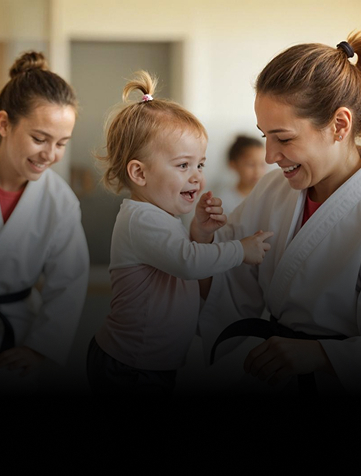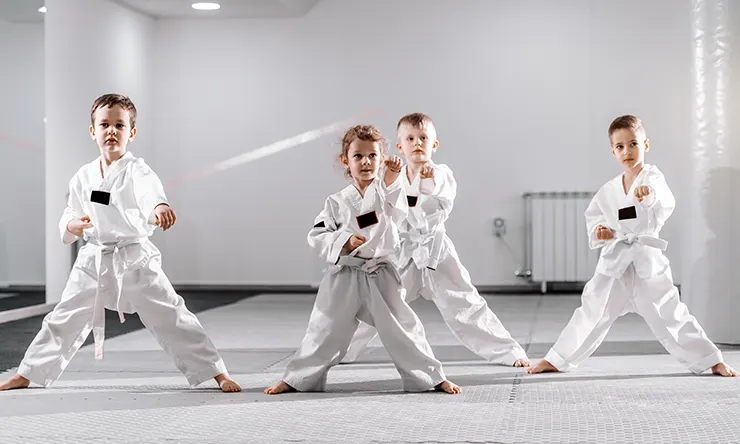Family Martial Arts – Activities that Bring Parents and Kids Together
Wiki Article
Just How Karate for Kids Can Boost Self-confidence and Discipline in Young Martial Artists
Karate for kids provides a distinct possibility to build confidence and technique in young martial musicians. As they find out new strategies and face difficulties, they not just acquire abilities but also establish a solid feeling of self-regard. This structured environment motivates them to appreciate the journey of improvement. But how does this training equate into their everyday lives? Discover the much deeper links that make karate greater than just a sporting activity.The Significance of Self-confidence in Childhood Years Advancement
Self-confidence is a crucial foundation in childhood years advancement. When you nurture your kid's self-worth, you encourage them to encounter difficulties, take dangers, and reveal themselves openly. Children with confidence are more ready to explore new tasks and social circumstances, which can bring about long-term friendships and valuable experiences.Encouraging your kid to step out of their convenience area promotes strength. They discover that failure isn't the end but rather a tipping stone to success. By celebrating their success, regardless of just how tiny, you aid them identify their abilities and worth.In this trip, support and positive reinforcement from you play an important duty. Whether it's with appreciation or merely existing, your involvement increases their confidence. As they grow, this self-assurance comes to be a long-lasting possession, equipping them to navigate both obstacles and opportunities with a strong feeling of self.Just How Karate Shows Self-control and Emphasis
Karate aids you develop technique and emphasis via its organized training regimen. As you practice mindfulness throughout each session, you'll find out to focus far better both on and off the floor covering. And also, setting and accomplishing goals in karate strengthens your ability to remain dedicated and alert.Structured Training Routine
While you participate in karate training, you'll swiftly find how a structured routine infuses technique and focus in young practitioners. Each course follows a specific format, consisting of warm-ups, technique practice, and sparring. This uniformity instructs you to commit and appreciate the procedure to enhancement. As you find out kinds and strategies, you create a sense of obligation for your very own progress.The structured setting encourages you to establish objectives, whether mastering a brand-new belt or refining a kata. You'll discover that remaining focused during drills and classes hones your focus. The technique you grow in martial arts prolongs beyond the dojo, positively affecting your schoolwork and daily routines. Each session reinforces the relevance of devotion, aiding you become a much more self-displined person.Mindfulness in Practice
As you exercise karate, you'll discover that mindfulness ends up being a crucial part of your training. Each relocation requires your complete focus, helping you remain focused on the here and now moment. You'll discover to tune out diversions and focus on your breathing, activities, and purposes. This enhanced recognition hones your reflexes and boosts your discipline.During sparring or types, you'll find the significance of being mentally existing - Karate Salisbury MD. You'll discover how this emphasis not just boosts your strategy but likewise builds your confidence. By exercising mindfulness in karate, you grow perseverance and resilience, necessary qualities that expand beyond the dojo. By doing this, martial arts shows you to harness your mind, assisting you develop a disciplined approach to obstacles both on and off the mat
Personal Goal Setting Techniques
Establishing objectives in martial arts isn't simply concerning gaining belts; it's an effective method to cultivate self-control and focus. When you set certain, attainable targets, you produce a roadmap for your progression. Rather of simply intending to enhance your kicks, try concentrating on understanding a particular method each month. This technique maintains you motivated and engaged.Breaking down bigger objectives into smaller sized, manageable steps aids you track your progress and commemorate little victories in the process. Whether it's refining your stance or enhancing your sparring endurance, every goal reinforces your dedication. As you achieve these goals, you'll construct self-confidence in your skills and develop a strong sense of discipline that expands beyond the dojo into day-to-day life.Building Durability With Martial Arts
Fighting style, particularly karate, offers youngsters a distinct opportunity to construct resilience in a supportive environment. In classes, they deal with difficulties that press their limits, whether it's competing or understanding a brand-new technique with a partner. Each obstacle, like a missed out on kick or a shed match, becomes a possibility to discover and grow.As they practice, kids discover to accept discomfort and keep trying, also when things obtain tough. They uncover that failure isn't the end; it belongs to the trip. This state of mind assists them recuperate stronger, not just in the dojo, but in day-to-day life.With each difficulty they overcome, your youngster constructs confidence in their capacity to deal with barriers, sustaining their decision. Via martial arts, they'll recognize that resilience isn't nearly physical stamina; it's concerning psychological grit and determination, empowering them to face whatever life tosses their means.The Function of Regard in Martial Arts Training
Respect is a fundamental principle in karate training, promoting a society of self-control and camaraderie among trainees. When you step onto the dojo flooring, you're not just learning techniques; you're additionally finding out to value your trainers, peers, and the art itself (Karate Salisbury MD). Bowing at the beginning and end of class isn't simply a rule; it symbolizes your acknowledgment of others' dedication.as and initiatives you develop mutual respect, you'll locate it enhances your discovering experience. You'll pay attention extra diligently to your teacher and gain insights from fellow students. This environment encourages constructive objection and support, permitting everyone to grow together.Moreover, respect grows self-control. Acknowledging the value of difficult job and humbleness aids you remain concentrated on your training. Subsequently, this respect equates right into your daily life, boosting your communications and relationships outside the dojo. With martial arts, you learn that respect is vital for individual development and neighborhood buildingAchieving and setting goals Success in Martial arts

Social Skills and Teamwork in the Dojo
While training in the dojo, children normally develop important social abilities and team effort capabilities. As they exercise together with peers, they learn to interact properly, share room, and support one another. Each class provides chances for collaboration, whether it's during companion drills or group workouts. This team effort fosters relationships and develops a sense of belonging, making the dojo a nurturing environment.Kids additionally gain beneficial dispute resolution abilities. When they run into obstacles, such as disputes during sparring, they find out to navigate these scenarios constructively. They exercise the original source perseverance and empathy, understanding that everyone has various toughness and weaknesses.Moreover, taking part in team activities cultivates a sense of responsibility. You'll see your youngster learning to rely upon teammates and take duty for their duty in a group. These experiences not only boost their martial arts journey but also furnish them with social tools they'll bring t sports live right into various other locations of life.
The Long-Term Benefits of Karate Beyond Childhood Years
As kids expand up and change right into the adult years, the advantages of karate expand much beyond the dojo. You'll discover that the technique and focus learned via martial arts can convert right into your professional and academic life. Setting and accomplishing goals in fighting styles fosters a solid work principles, which can push you to master any endeavor.Moreover, the self-confidence gained from competing and grasping techniques can enhance your self-esteem, assisting you deal with difficulties head-on. This resilience comes to be vital as you face the uncertainties of adulthood.Additionally, the social skills created through team effort and camaraderie in the dojo can bring about far better connections in both personal and expert spheres. You'll discover to connect effectively, resolve conflicts, and develop a supportive network.Ultimately, karate forms not just experienced martial musicians, however well-shaped individuals all set to tackle the globe.Frequently Asked Concerns
What Age Is Finest to Begin Karate for Children?
You can start martial arts as early as age 4 or 5, but it frequently depends upon your youngster's maturation and passion. Locating a course that fits their age and power degree makes a huge difference.Are There Any Kind Of Health Perks From Exercising Martial Arts?
Yes, practicing karate deals many wellness benefits. You'll improve your adaptability, coordination, and toughness while increasing cardio health and fitness. And also, it improves focus and mental health, making it an amazing choice for total physical and mental wellness.Just How Commonly Should Kids Participate In Karate Courses?
You must urge your kids to participate in karate courses a minimum of 2 to 3 times a week. Consistency assists them discover strategies effectively and develop abilities, making their experience extra delightful and gratifying over time.Can Karate Assist With Handling Anxiety in Kid?
Yes, karate can aid manage stress and anxiety in kids. It teaches focus and self-constraint while offering a secure outlet for power. You'll discover your kid expanding more tranquil and certain as they exercise on a regular basis.What Gear Is Required for Children Starting Martial Arts?
Report this wiki page